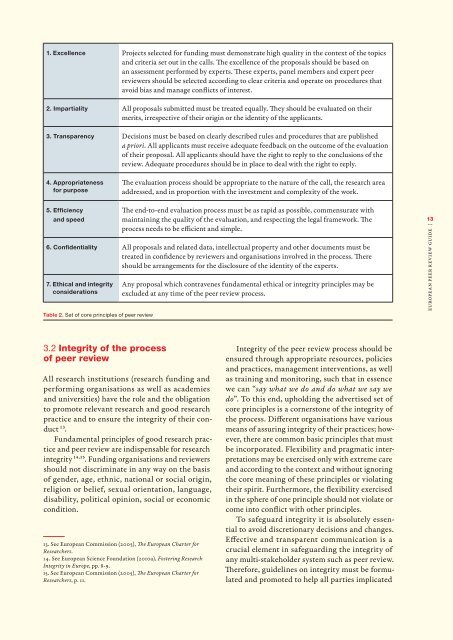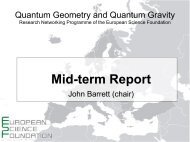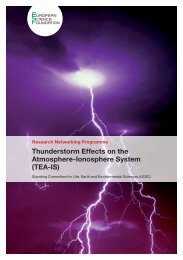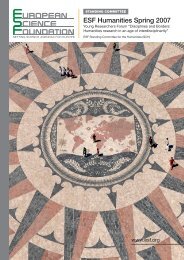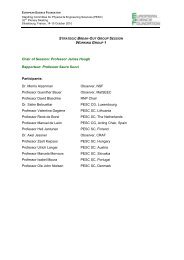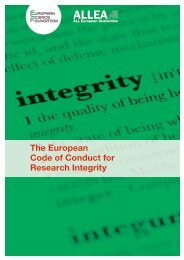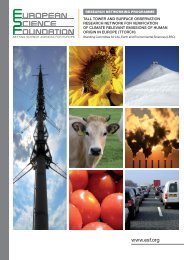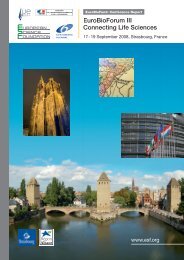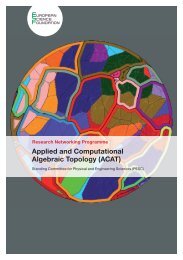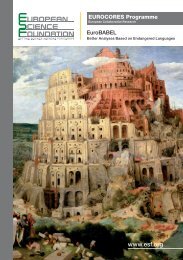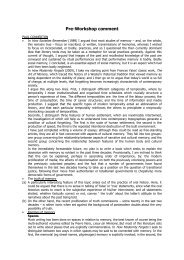European Peer Review Guide - European Science Foundation
European Peer Review Guide - European Science Foundation
European Peer Review Guide - European Science Foundation
Create successful ePaper yourself
Turn your PDF publications into a flip-book with our unique Google optimized e-Paper software.
1. Excellence Projects selected for funding must demonstrate high quality in the context of the topics<br />
and criteria set out in the calls. The excellence of the proposals should be based on<br />
an assessment performed by experts. These experts, panel members and expert peer<br />
reviewers should be selected according to clear criteria and operate on procedures that<br />
avoid bias and manage conflicts of interest.<br />
2. Impartiality All proposals submitted must be treated equally. They should be evaluated on their<br />
merits, irrespective of their origin or the identity of the applicants.<br />
3. Transparency Decisions must be based on clearly described rules and procedures that are published<br />
a priori. All applicants must receive adequate feedback on the outcome of the evaluation<br />
of their proposal. All applicants should have the right to reply to the conclusions of the<br />
review. Adequate procedures should be in place to deal with the right to reply.<br />
4. Appropriateness<br />
for purpose<br />
The evaluation process should be appropriate to the nature of the call, the research area<br />
addressed, and in proportion with the investment and complexity of the work.<br />
5. Efficiency<br />
and speed<br />
The end-to-end evaluation process must be as rapid as possible, commensurate with<br />
maintaining the quality of the evaluation, and respecting the legal framework. The<br />
process needs to be efficient and simple.<br />
6. Confidentiality All proposals and related data, intellectual property and other documents must be<br />
treated in confidence by reviewers and organisations involved in the process. There<br />
should be arrangements for the disclosure of the identity of the experts.<br />
7. Ethical and integrity<br />
considerations<br />
Table 2. Set of core principles of peer review<br />
Any proposal which contravenes fundamental ethical or integrity principles may be<br />
excluded at any time of the peer review process.<br />
13<br />
<strong>European</strong> <strong>Peer</strong> <strong>Review</strong> <strong>Guide</strong><br />
3.2 Integrity of the process<br />
of peer review<br />
All research institutions (research funding and<br />
performing organisations as well as academies<br />
and universities) have the role and the obligation<br />
to promote relevant research and good research<br />
practice and to ensure the integrity of their conduct<br />
13.<br />
Fundamental principles of good research practice<br />
and peer review are indispensable for research<br />
integrity 14,15. Funding organisations and reviewers<br />
should not discriminate in any way on the basis<br />
of gender, age, ethnic, national or social origin,<br />
religion or belief, sexual orientation, language,<br />
disability, political opinion, social or economic<br />
condition.<br />
13. See <strong>European</strong> Commission (2005), The <strong>European</strong> Charter for<br />
Researchers.<br />
14. See <strong>European</strong> <strong>Science</strong> <strong>Foundation</strong> (2010a), Fostering Research<br />
Integrity in Europe, pp. 8-9.<br />
15. See <strong>European</strong> Commission (2005), The <strong>European</strong> Charter for<br />
Researchers, p. 11.<br />
Integrity of the peer review process should be<br />
ensured through appropriate resources, policies<br />
and practices, management interventions, as well<br />
as training and monitoring, such that in essence<br />
we can “say what we do and do what we say we<br />
do”. To this end, upholding the advertised set of<br />
core principles is a cornerstone of the integrity of<br />
the process. Different organisations have various<br />
means of assuring integrity of their practices; however,<br />
there are common basic principles that must<br />
be incorporated. Flexibility and pragmatic interpretations<br />
may be exercised only with extreme care<br />
and according to the context and without ignoring<br />
the core meaning of these principles or violating<br />
their spirit. Furthermore, the flexibility exercised<br />
in the sphere of one principle should not violate or<br />
come into conflict with other principles.<br />
To safeguard integrity it is absolutely essential<br />
to avoid discretionary decisions and changes.<br />
Effective and transparent communication is a<br />
crucial element in safeguarding the integrity of<br />
any multi-stakeholder system such as peer review.<br />
Therefore, guidelines on integrity must be formulated<br />
and promoted to help all parties implicated


